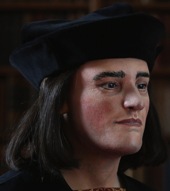We Speak No Treason
 Rosemary Hawley Jarman, We Speak No Treason.
Rosemary Hawley Jarman, We Speak No Treason.
This novel opens to an air of great suppressed excitement, menace, magic and witchcraft at the home of the Woodvilles. At first we don’t know what is going on.
Elizabeth, a beautiful young widow and her two sons are depicted as very human, ordinary persons caught up in the schemes of her designing mother, Jacquetta of Luxemburg, and ruthless brother, Anthony, who see a chance of regaining all that they had lost in their support of Lancaster. Nan, a poor relation, observes all that happens, and through her horrified eyes we are made privy to the whiffs of witchcraft, skulduggery, spells and incantations that are used to secure the person of the young King Edward IV as consort to a willing and slightly bemused Elizabeth, and we observe as they perform their secret and unholy rituals to bring it all to fruition.
Like Nan, we learn too that the king has a much younger brother, Gloucester, who, after she speaks to a young messenger from the court, seems to be a miniature Sir Galahad. Our interest like hers is cleverly lit.
Eventually the secret marriage to the king is revealed and Elizabeth and her entourage invade the court. Nan cleverly ensures that she is one of the many who follow in her slipstream as maid to the aged Jacquetta and through Nan’s excited eyes we are introduced to the whole bevy of powerful figures that orbit around Elizabeth and Edward and the interplay between Clarence, Warwick, Hastings, the Woodvilles, Edward, Elizabeth and others.
We also glimpse Richard, a square peg in a round hole, for the first time. His loneliness is palpably obvious and his love of his elder brother shines pathetically through. Time and again we see the closeness of Richard and Edward interrupted by the machinations of Elizabeth and her unscrupulous siblings and intimates, and we also observe the real friendship that develops between Katherine, the young Dowager Duchess of Desmond and Richard. Openly, generously, she covers any embarrassment that is meted out to the socially unsure prince by Elizabeth and her minions. Katherine too is lonely and they share each others pain and helplessness .
When Richard seeks a hiding place where he may lick his wounds, he suddenly discovers Nan who is already half in love with him. Their first love is handled beautifully.
Patch, Edward’s Fool, who also loves Nan, is very jealous, envious and wary of Richard and his intentions.
As Richard goes off to take up his first command, Nan finds her way to his tent on the battlefield prior to the battle, but Richard is lit up with his dreams of glory and has little time to spare for dreams of dalliance and so they part.
She, now pregnant and alone, escapes to a convent nearLeicester and he, unaware, joyfully marches off to fulfil his destiny.
Patch now becomes our reporter at court. It is he who discovers Anne Neville in a Cook Shop and, unsure of Richard’s intentions, he eventually informs him, who then moves like lightning to rescue Anne and place her in the sanctuary. Richard gratefully asks Patch to accompany him and Anne to Middleham. Through Patch’s reluctant acceptance then final admiration of Richard we can appreciate how the reluctant north becomes Richard’s heartland. It is cleverly done.
Nan learns of Anne’s and Richard’s marriage and reluctantly has to accept the fact, knowing that the greatest gift she can give him is their daughter whom she has named Katherine, in memory of the lovely Dowager Duchess of Desmond. Anne’s acceptance of her and Richard’s bastard son John into her heart and home is beautifully done.
Nan becomes a nun and is on hand to accept Richard’s body after the carnageof Redemore Plain, now known as Bosworth Field, and Patch’s allegiance moves to Richard’s niece, Bess, and we see Tudor’s court through his eyes.
In a closing scene Bess and Grace, one of her father’s natural daughters, ruefully reflect on the Tudor spin that has blackened Dickon’s name and wonder what posterity will make of it all.
I loved this book , in spite of its very strong anti-Elizabeth Woodville bias. The uncomplicated young widowed mother of the opening scenes is a far cry from the queen of the rest of the book, but by then she and hers have so much more to lose. I began to comprehend how people of those times could be drawn to consider witchcraft and black magic as possible explanations for the unexplainable.
Thoroughly recommended.
